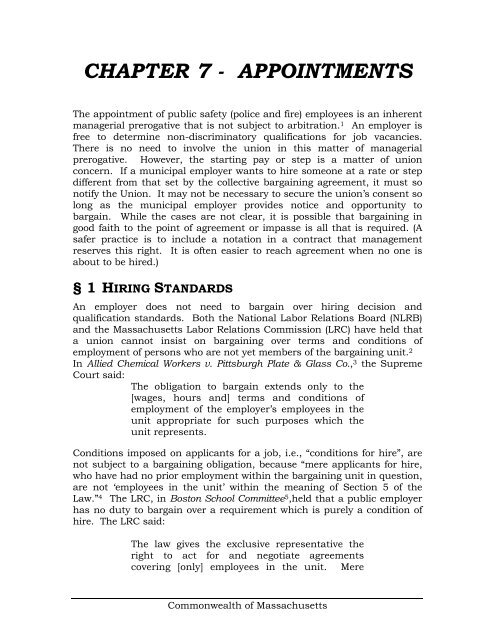Management Rights - AELE's Home Page
Management Rights - AELE's Home Page
Management Rights - AELE's Home Page
Create successful ePaper yourself
Turn your PDF publications into a flip-book with our unique Google optimized e-Paper software.
CHAPTER 7 - APPOINTMENTS<br />
The appointment of public safety (police and fire) employees is an inherent<br />
managerial prerogative that is not subject to arbitration. 1 An employer is<br />
free to determine non-discriminatory qualifications for job vacancies.<br />
There is no need to involve the union in this matter of managerial<br />
prerogative. However, the starting pay or step is a matter of union<br />
concern. If a municipal employer wants to hire someone at a rate or step<br />
different from that set by the collective bargaining agreement, it must so<br />
notify the Union. It may not be necessary to secure the union’s consent so<br />
long as the municipal employer provides notice and opportunity to<br />
bargain. While the cases are not clear, it is possible that bargaining in<br />
good faith to the point of agreement or impasse is all that is required. (A<br />
safer practice is to include a notation in a contract that management<br />
reserves this right. It is often easier to reach agreement when no one is<br />
about to be hired.)<br />
§ 1 HIRING STANDARDS<br />
An employer does not need to bargain over hiring decision and<br />
qualification standards. Both the National Labor Relations Board (NLRB)<br />
and the Massachusetts Labor Relations Commission (LRC) have held that<br />
a union cannot insist on bargaining over terms and conditions of<br />
employment of persons who are not yet members of the bargaining unit. 2<br />
In Allied Chemical Workers v. Pittsburgh Plate & Glass Co., 3 the Supreme<br />
Court said:<br />
The obligation to bargain extends only to the<br />
[wages, hours and] terms and conditions of<br />
employment of the employer’s employees in the<br />
unit appropriate for such purposes which the<br />
unit represents.<br />
Conditions imposed on applicants for a job, i.e., “conditions for hire”, are<br />
not subject to a bargaining obligation, because “mere applicants for hire,<br />
who have had no prior employment within the bargaining unit in question,<br />
are not ‘employees in the unit’ within the meaning of Section 5 of the<br />
Law.” 4 The LRC, in Boston School Committee 5 ,held that a public employer<br />
has no duty to bargain over a requirement which is purely a condition of<br />
hire. The LRC said:<br />
The law gives the exclusive representative the<br />
right to act for and negotiate agreements<br />
covering [only] employees in the unit. Mere<br />
Commonwealth of Massachusetts
















